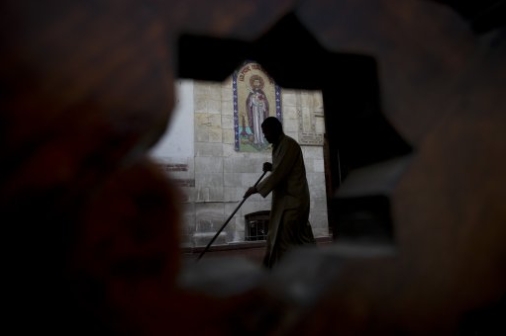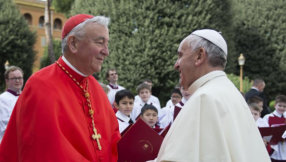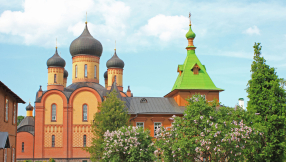
A three hour debate in Parliament yesterday resulted in broad spectrum of agreement on the severity of the global persecution of Christians and the need for the issue to receive wider attention worldwide.
Countries of concern mentioned during the debate were Pakistan, Syria, Iraq, Egypt, Nigeria, China, North Korea, Burma, Eritrea and Iran.
The issue of persecution against Christians was brought forward by the Democratic Unionist MP for Strangford, Jim Shannon, who opened the discussion with some harrowing statistics, stating that a hundred thousand Christians will have been killed in 2013 for their faith, while 200 million will have experienced persecution.
"One and a half billion Christians live in what can be termed as dangerous neighbourhoods. That shows the magnitude of the problem of persecuted Christians," he said.
The House was united over party lines, with Church Commissioner and Tory MP, Sir Tony Baldry saying, "There is now practically no country — from Morocco to Pakistan — in which Christians can freely practise their religion. That must be a matter of real concern to this House."
Noting the arrival of the Christmas season, Mr Baldry said that not only would the celebration be virtually non-existent in many of the traditionally Biblical lands, but also that "Joseph would not now be advised to take Mary to Egypt to avoid the dangers of Herod, because Jesus would just not have been safe there today".
Christians in Egypt have experienced a wave of deadly attacks following the revolution in 2011 and the recent overthrow of President Mohamed Morsi, with members of the Muslim Brotherhood accusing them of colluding in his removal.
Parliament heard from Democratic Unionist David Simpson that in India there had been "kidnappings, forced marriages, 18,000 people injured, 6,000 houses and 296 churches and small places of Christian worship burned and pastors murdered".
Tory MP for London and Westminster, Mark Field suggested the persecution of Christians was tolerated in a way that attacks on other faiths are not.
"If this were happening to almost any other religious group it would be something of a national scandal," he said.
Labour MP for Ealing North, Stephen Pound said that it was "beyond doubt … [that] Christians are the most persecuted single group in the world today on grounds of religion".
Labour's Edinburgh North MP, Mark Lazarowicz made similar comments: "The fact is that Christians face persecution and harassment in more countries than any other faith group."
Despite general overall support from Labour, independent MP Lady Hermon challenged Tom Greatrex to explain why so few of his Labour colleagues had turned out for the debate.
"I am absolutely baffled by their absence," she said.
There was also unity across faith lines, with Conservative MP Rehman Chishti speaking out from an Islamic perspective.
"When I saw that the topic was 'Persecution of Christians in the 21st century', I knew that it was absolutely right and proper to have a debate on that subject. It is important for the world to realise that persecution goes on," he said.
Mr Chishti recalled a recent conversation with the former Bishop of Rochester, the Right Reverend Michael Nazir-Ali, who told him that the persecution of Christians was taking place in more than 130 of the 190 countries in the world at the present time.
"That is completely and utterly unacceptable, it is a very sad state of affairs," Mr Chishti said.
He also noted that Amnesty International was among the organisations calling for Pakistan's Blasphemy laws to be repealed on the grounds that the laws are being used to persecute the country's minority faiths, which include Christians.
Parliament heard that persecution was not limited to countries where Christians were in minorities but was also happening where they are in equal or comparable numbers, such as in Nigeria, where an estimated 900 Christians have been killed by Islamist militant group Boko Haram.
There were suggestions that there should be more focus on the potential use of international human rights instruments, and that the Commonwealth should get more involved in cases in Nigeria, Malaysia, and India.
Simon Hughes, the Liberal Democrat MP for Bermondsey and Old Southwark suggested the Government and the Commonwealth be much "more proactive" in addressing the persecution of Christians.
In response to the debate, Foreign Office minister Mark Simmonds sought to assure the House of Commons that freedom of religion is a priority for the Government.
"Let me be absolutely clear to the House: the Government are not silent and the Government are not quiet. When Christians are persecuted, we, as Government ministers, speak out clearly and forcefully," he said.
"I cannot stress enough how seriously the Foreign and Commonwealth Office takes this issue, as part of our commitment to freedom of religion around the world.
"Promoting respect for human rights is at the very heart of the Government's foreign policy. Where Christians or any religious believers are victims of persecution, we will condemn the violence and ask the relevant authorities to ensure that justice is served.
"There can be and should be no impunity for those who persecute individuals on the basis of religion or belief."
As Christians in Britain look forward to celebrating the festive season freely, Labour MP Stephen Pound asked them to remember the persecuted church worldwide.
"The power of prayer is immense and it has an incredible force," he said. "Let us never forget suffering Christians in our prayers. Let us continue to do that. Advent might be a couple of days old, but this is a powerful season for prayer."
Christian Solidarity Worldwide's Chief Executive Mervyn Thomas welcomed the attention given to the issue in Parliament and expressed a desire to work more closely with the Government on practical ways to stop persecution and promote religious freedom.
"This debate is hugely important in shining a spotlight on the worldwide persecution of Christians and, in so doing, highlighting the significance of freedom of religion or belief for all," he said.
"The persecution of Christians has been a much overlooked issue for too long, and the severity of the situation, which is worsening in many parts of the world, has been largely ignored."













